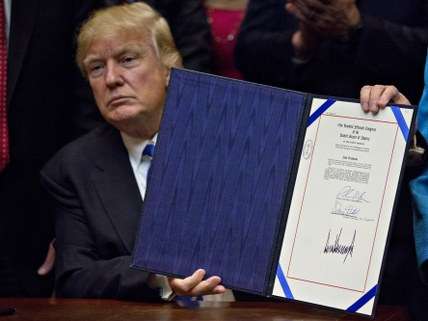The Coming Federal Fiscal Binge
Ready for another round of tax cuts combined with spending increases?

William Safire said that as a speechwriter for Richard Nixon, he would sometimes urge the president, "Take the easy way!" Nixon could then give a speech saying he had rejected advice from his aides to take the easy way, preferring to do what was right.
Politicians may pretend to make hard choices, but they rarely do. Those in office now won't be inspired to heroic deeds by the failure to repeal Obamacare. Just the opposite.
The lesson of this episode is that it's hard to reach agreement on taking things away from the voters. The corollary is that it's easy to reach agreement on giving things to the voters. The obvious next step is a fiscal binge that serves the selfish interests of everyone except posterity.
Here's how it may play out: Congressional Republicans pass tax cuts. Democrats join them on a big infrastructure bill. President Donald Trump's proposed spending cuts come to little or nothing. The deficit balloons, and not many people in Washington care.
Robert Bixby, executive director of The Concord Coalition, a nonpartisan budget watchdog, tells me, "There's a political logic to it: 'You get what you want. We get what we want. And the future will pay for it.'" Marc Goldwein, senior policy director of the Committee for a Responsible Federal Budget, agrees: "The risk of irresponsibility is high."
Having lost on overhauling health care, Trump indicated he is ready to move on to tax reform. This choice evoked chortles from skeptics, who say a major revision of the Internal Revenue Code will be an even harder challenge.
But why assume Republicans will balk at anything short of a comprehensive overhaul? If they can't get that—and there is no reason to think they can—they will almost certainly settle for tax cuts, even if it means bigger budget deficits. That's been their default option for decades.
Trump couldn't care less about the deficit. So GOP members will meet no particular resistance from him if they want to cut rates, scrap the estate tax or the alternative minimum tax, or increase the standard deduction.
House Speaker Paul Ryan has in mind a border adjustment tax, which would bring in enough revenue to make up all or most of what the other changes would lose. But neither Trump nor congressional Republicans are likely to approve a measure that would raise consumer prices and be hard to explain. The path of least resistance involves dropping the proposal and not bothering to pay for the tax cuts.
Paying for them holds little allure because it would mean either killing tax breaks cherished by millions of people or curtailing outlays. Trump has proposed some $54 billion in spending reductions, taken from agencies ranging from the Environmental Protection Agency to the National Endowment for the Arts, but those couldn't be used to offset tax cuts. The money saved is supposed to go for Trump's military buildup.
But rest assured, it won't be saved in the first place. "Some of Trump's closest allies said his budget has virtually no chance in Congress," reported The Washington Post. "Even those fiscal conservatives who do want to cut spending don't necessarily think slashing major domestic programs is the answer."
The only other place where spending could be cut much is in the biggest entitlements—Social Security, Medicare and Medicaid. But Trump the candidate promised not to go after Social Security and Medicare. Leaving Obamacare alone means Medicaid escaped the ax.
The president should have more luck boosting outlays. He envisions a $1 trillion program aimed at "revitalizing our country's ruined roads, crumbling bridges and outdated airports," Press Secretary Sean Spicer explained. Trump told The New York Times he intends to "prime the pump to some extent. In other words: Spend money to make a lot more money in the future."
It's a classic Keynesian formula with a long Democratic pedigree. Getting bipartisan support should not be a heavy lift. The website Axios reports that House Democratic leader Nancy Pelosi "wants Trump to move quickly on a 'big jobs bill' that includes some corporate and middle income tax cuts coupled with government spending to stimulate growth."
The problem with all this is that it would squander money we don't have, further enlarging our national debt and loading more burdens onto our children and grandchildren. That's not the responsible way, but it is the easy way. And politicians will be eager to take it.
© Copyright 2017 by Creators Syndicate Inc.


Show Comments (26)